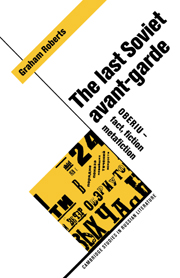Book contents
- Frontmatter
- Contents
- Acknowledgements
- Notes on transliteration and conventions
- Introduction: OBERIU – the last Soviet avant-garde
- 1 Authors and authority
- 2 Rereading reading
- 3 Language and representation
- Conclusion: OBERIU – between modernism and postmodernism?
- Notes
- Bibliography
- Index
- CAMBRIDGE STUDIES IN RUSSIAN LITERATURE
2 - Rereading reading
Published online by Cambridge University Press: 02 September 2009
- Frontmatter
- Contents
- Acknowledgements
- Notes on transliteration and conventions
- Introduction: OBERIU – the last Soviet avant-garde
- 1 Authors and authority
- 2 Rereading reading
- 3 Language and representation
- Conclusion: OBERIU – between modernism and postmodernism?
- Notes
- Bibliography
- Index
- CAMBRIDGE STUDIES IN RUSSIAN LITERATURE
Summary
ADDRESSING THE READER: RUSSIAN MODERNISM AND THE AVANT-GARDE
As well as decentring the creative subject from the text, many Russian modernists sought to re-evaluate the role of the reader/spectator in the aesthetic process. The high-Symbolist, egocentric concept of the author as solitary discoverer of higher realities gave way to the Acmeist principle of the text as communication with the reader. The communicative nature of Acmeism was emphasized in theoretical essays by Mandel′shtam and Gumilev, respectively entitled ‘On the Addressee’ (‘O sobesednike’, 1913) and ‘The Reader’ (‘Chitatel′’). Mandel′shtam was particularly critical of the Symbolists' refusal to ask the ‘extremely modern’ question, ‘just whom is the poet speaking to?’ (‘s kem zhe govorit poet?’; ‘O sobesednike’, p. 234). He compared a poem to a message in a bottle, maintaining that while neither was written with a specific reader in mind, both were addressed to someone (the poem's addressee being ‘the reader in posterity’, ‘chitatel[′] v potomstve’; p. 235). But despite Mandel′shtam's insistence on the importance of the reader as ‘interlocutor’ (the literal meaning of ‘sobesednik’), the Acmeists fell short of advocating a genuine dialogue between poet and reader. Ultimately, the Acmeists' concept of a ‘good’ reader was one who would be somehow changed by the poem; there was no suggestion that the presence of the reader should have any effect on the composition of the poem itself.
- Type
- Chapter
- Information
- The Last Soviet Avant-GardeOBERIU - Fact, Fiction, Metafiction, pp. 75 - 119Publisher: Cambridge University PressPrint publication year: 1997

